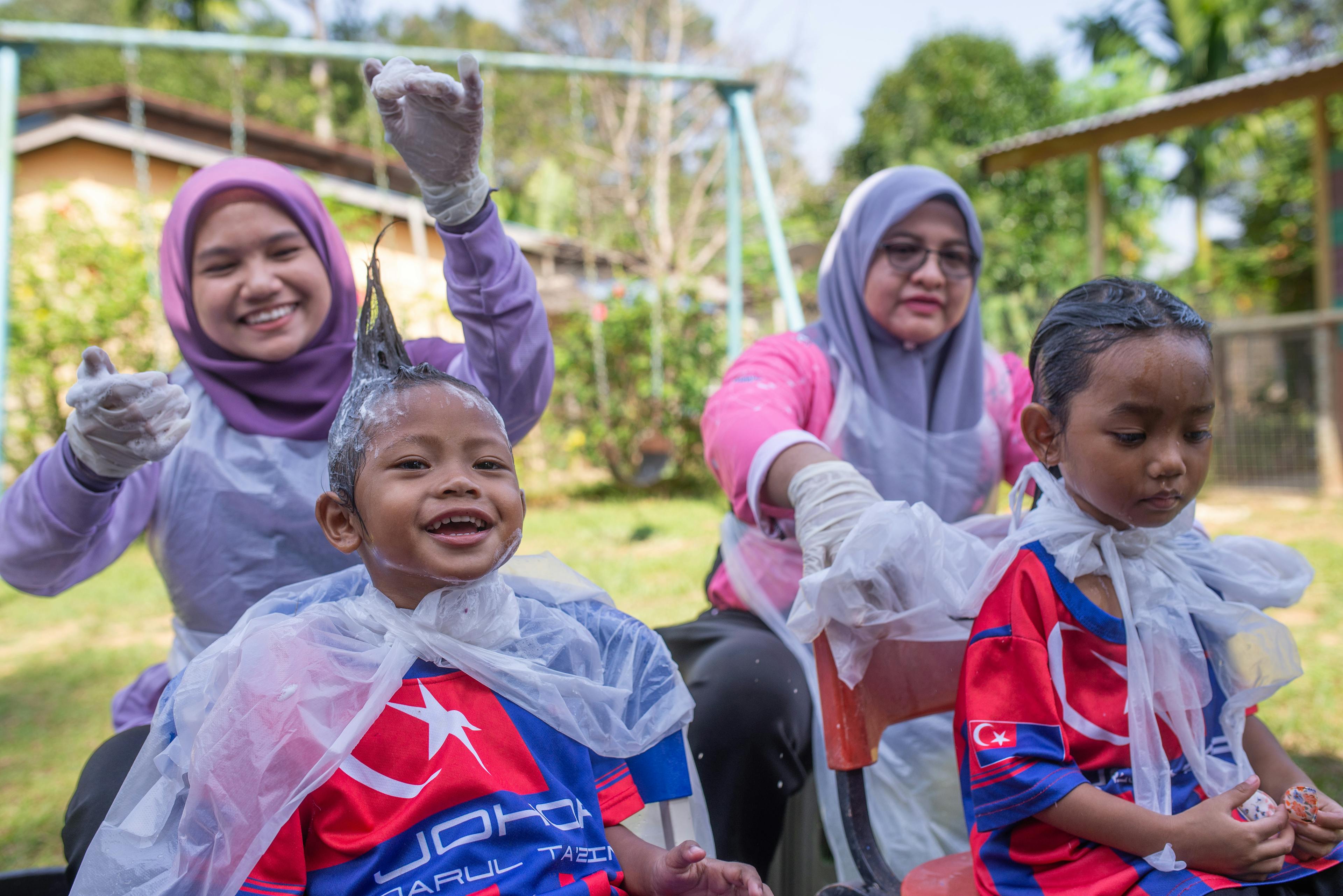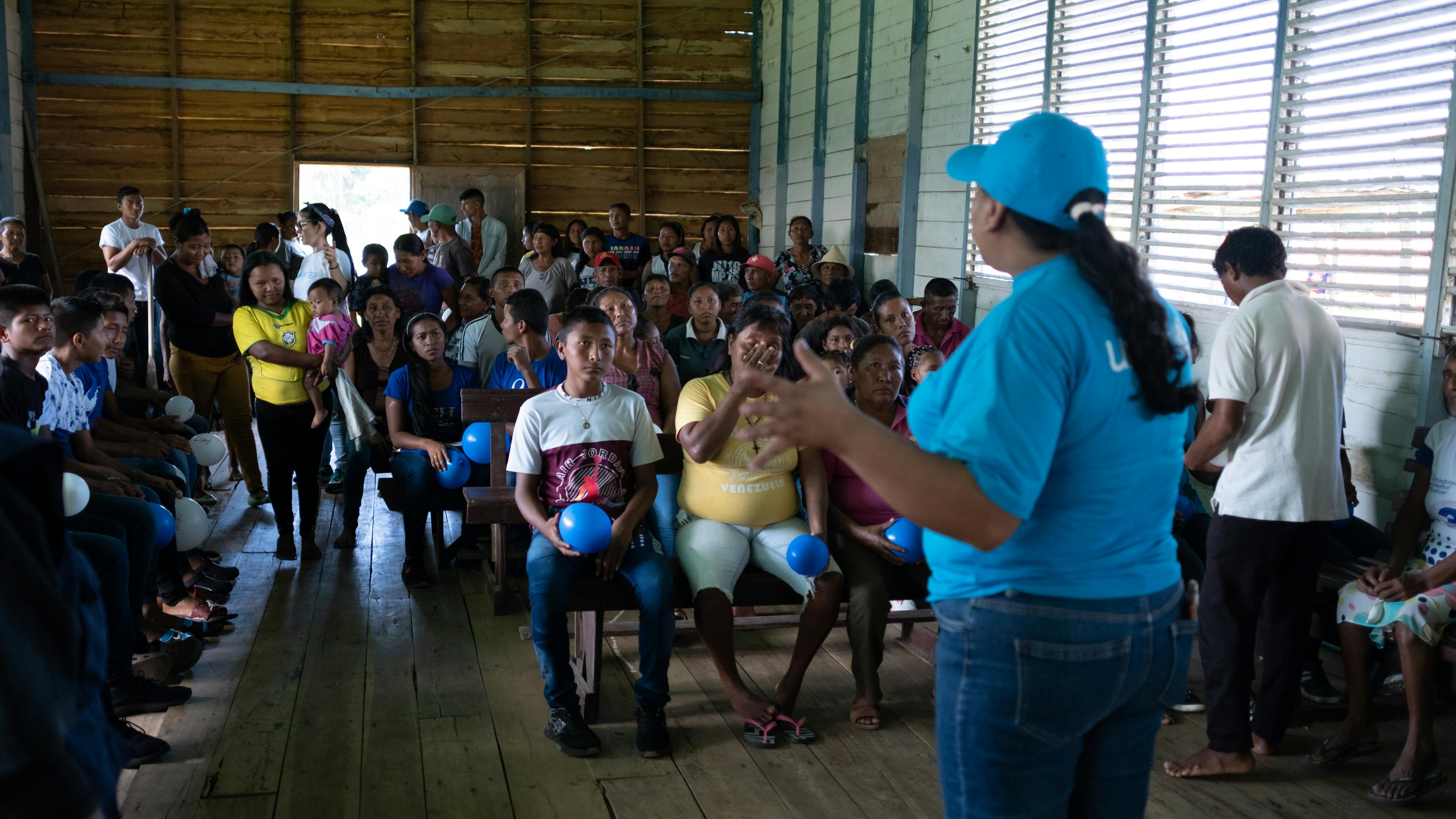
The Good News, July Edition
Home
Stories
The Good News, July Edition
Supporting Indigenous communities as they navigate the climate crisis.
Across the globe, the climate crisis is severely impacting the health and well-being of indigenous communities.
For children in these communities, the climate crisis is not just eroding their homes, lands, environments, and cultures, it’s also diminishing their opportunities to grow and thrive - their potential and their futures.
Mitigating this is a huge part of UNICEF’s mahi in the climate action space. The ways we do this are context-specific. UNICEF works with local partners, community leaders, governments and grass-roots organisations to find solutions to complex problems in ways that respect and honour the culture they impact.
UNICEF doesn’t claim to know it all, we’re the enablers, offering technology and innovation that’s backed by science and data. We work with local experts in these fields who have unbelievable empathy and heart, and whose sole-mission is to make the world better for children everywhere. We also provide a platform for youth to share in this vision and do whatever we can to encourage them and amplify their voices and solutions. "These are some of the examples of all this collaboration and dedication in action".
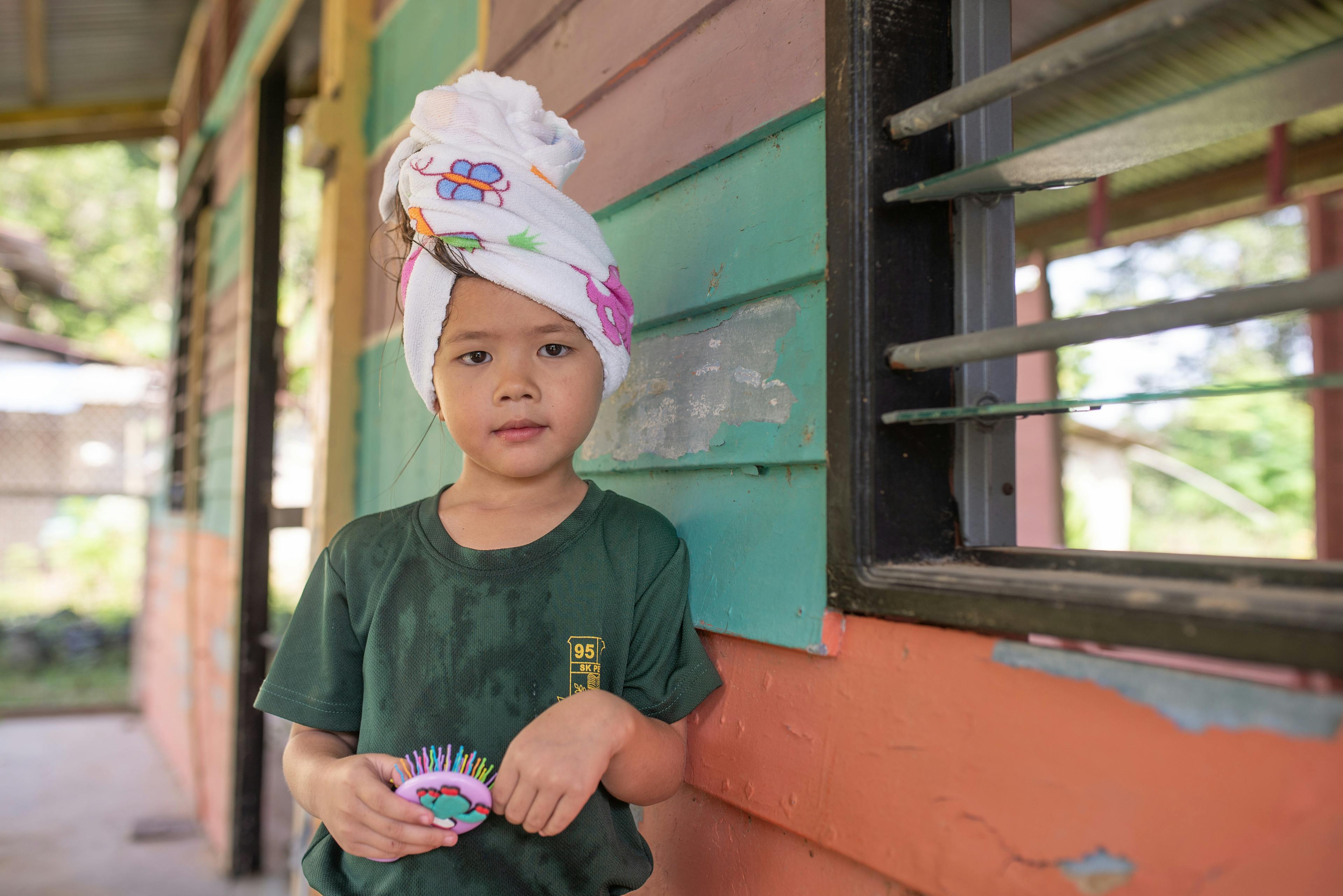
Mobile Clinics in Malaysia
Kampung Punan, Kampung Tewowoh and Kampung Peta are homes to one of Malaysia’s indigenous communities, the Jakun people. They live in the dense tropical jungles of the interior part of Mersing, Johor and the villages can only be accessed by boats or 4x4 vehicles. One of the villages, Kampung Peta, sits in Endau-Rompin Johor National Park. In March 2023, the village was submerged in flood waters and some of the places temporarily vanished from the map.
Mobile clinics that serve indigenous communities in Johor, Malaysia, often do much more for children than treating illness. As witnessed by the UNICEF team during a visit in June 2023, the dedicated healthcare workers also provide hair treatment, eye and teeth checks, and so much more to ensure the children in these remote communities can live their best life.
The trip to Mersing, Johor, was a documentation trip as part of a collaboration between UNICEF and the Ministry of Health, funded by the Government of Japan’s Last One Mile Support grant. The journey via a small dirt road showed how difficult it is to reach some of these indigenous communities with life-saving assistance. The mobile health clinics conducted the usual, necessary checks for mothers and babies to ensure both were healthy. Growth milestones such as weight and size are important to take note of especially in communities where adequate nutrition may be a challenge.
However, the mobile clinic team, led by the Mersing District Health Office (PKD) did much more. From dental check-ups to awareness raising on malaria and other mosquito borne diseases, the day was packed with invaluable care to the community in order to safeguard kids’ health. This is especially pertinent during times of unpredictable climate changes, which has a knock-on effect on the health of children.
UNICEF has been instrumental in delivering equipment to these mobile clinics in hard-to-reach areas throughout the country including Sarawak, Saba and Johor. The equipment was worth USD1.1 and included 13 units of Toyota Hilux 2.8 Rogue Diesel, 125 vaccine carriers, 100 defibrillators (AED), 20 vital sign monitors, 100 multi-purpose emergency backpacks, 100 Pelican Protector Cases, 175 laptops and thousands of examination gloves to multiple locations throughout the country.
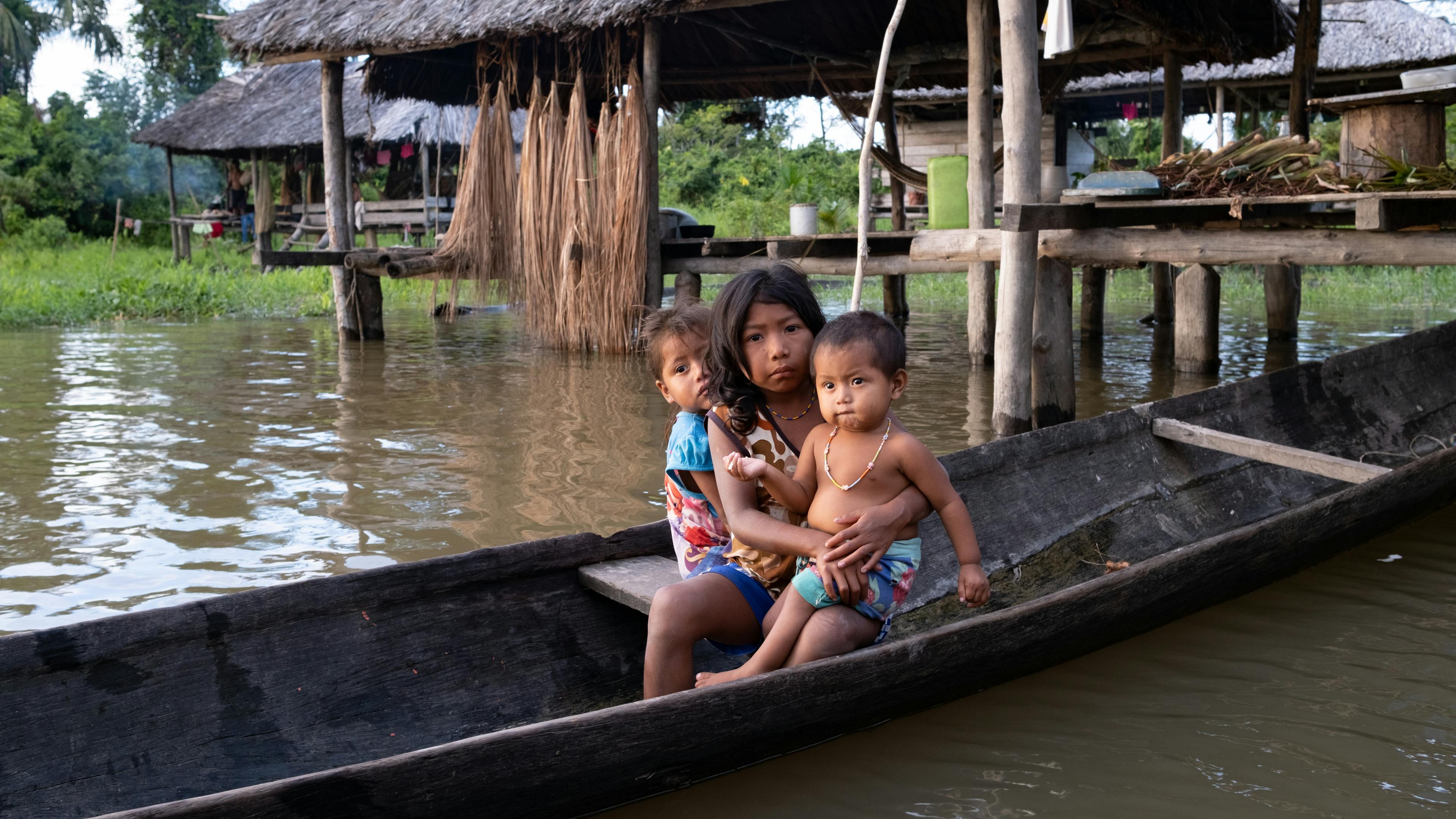
Clean water in Venezuela
In Venezuela, indigenous communities including the Warao, Wayuú, Yukpa, Pemón, among others, each live within a distinct national territory and each with their own language, culture, and history.
In the case of the Warao indigenous people, who live in the entire lower Delta Amacuro, the effects of climate change – periods of droughts followed by flooding - have impacted the remote communities’ access to safe water. This has affected the health of children and their families. UNICEF stepped in to support them and provided the first water treatment plant run by solar power as well as community support initiatives to manage its maintenance and up-keep. The water treatment plant has reached hundreds of families.
Key to this successful strategy in such a highly vulnerable area, has been working with people like María Torres. As an indigenous Warao consultant for UNICEF, Maria engaged with the community in their own language, she also understands the culture and can respectfully ensure interventions are adapted to the context.
“There is a marked difference because you can feel their trust, and they understand the message better. The community members receive information better, with greater interaction and participation, the community participates in all activities and makes their worries known, helping us to do our work better,” says Maria.
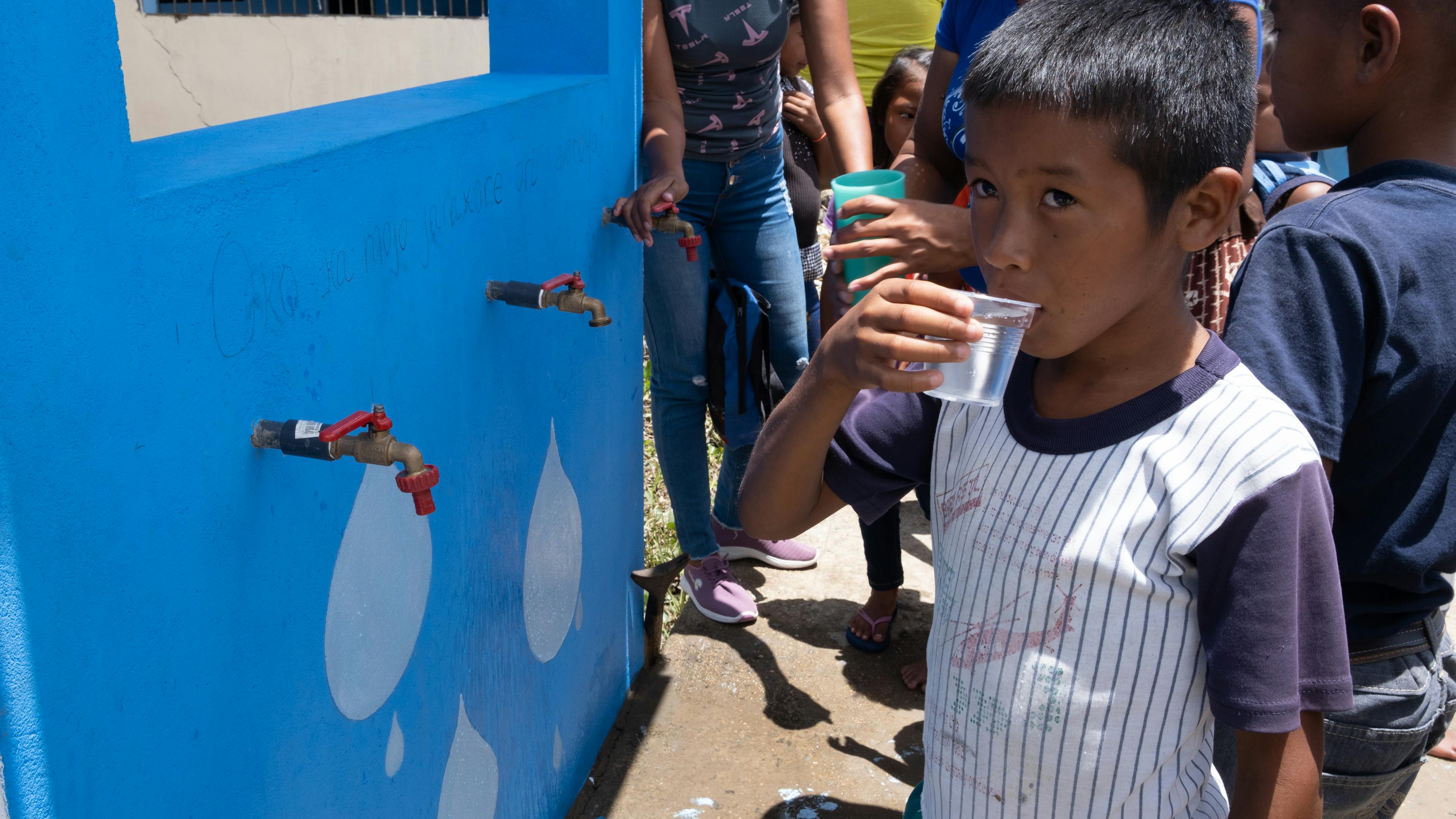
The solar-powered water treatment plant sits right next to the community hospital. This not only provides safe drinking water for people in the community and nearby villages but has also improved the water quality of the health centre for safe deliveries, better breastfeeding practices, and safe and dignified care for children requiring hospitalization. Hygiene promotion activities are also conducted throughout the community to ensure safe practices to prevent disease and even death.
Nardi Torres, a teacher and UNICEF Accountability to Affected Populations Officer who belongs to the neighbouring Pemón community, facilitates communication and proximity of programmes with her own community.
“Working in contexts of extreme need and vulnerability is hard work that requires persons who are not only qualified but also committed to reaching positive but contextualized results, persons who defend rights but also the culture, who stand for the sustainability of material and environmental resources,” says Nardi.

Understanding UNICEF Aotearoa’s role in supporting Māori and Pasifika youth
As the world's biggest children's charity, UNICEF needs to ensure its operations are tailored to the unique context and situation of every country office or National committee. In Aotearoa, unlike less resourced countries like Venezuela or Malaysia, our mandate is not supporting social development or humanitarian projects. Aotearoa is economically secure and free of socio-political conflict, which means that our mahi here has two functions: fundraising for UNICEF globally and advocating for the rights of rangatahi and tamariki in New Zealand. We partner with youth-led organizations to amplify the voices of youth and the issues facing them. We advocate for children in Aotearoa and work to influence policy that affects them, ensuring that the Government upholds the International Convention of the Rights of the Child which Aotearoa signed in 1993.
The voices of indigenous rangatahi are central to this.
Even though Aotearoa has made progress in addressing the inequities caused by our history of colonisation, that legacy still remains, with indigenous children. Part of our mahi in New Zealand is creating spaces for Māori and Pasifika tamariki and rangatahi to be heard. In 2021 we collaborated with the Centre for Indigenous Psychologies and Massey University and hosted a research hui with rangatahi Māori from around the country. The hui’s purpose was to listen to rangatahi concerns about the environment and how climate change impacts them.
A core component in our local advocacy for youth is through our annual Young Ambassador Programme. The programme is an opportunity for diverse young people, including rangatahi Māori, across the motu to get up-close with leaders in industry and politics and to make their voices heard. In 2023 our cohort of Young Ambassadors were supported to attend the pinnacle of the global climate solutions COP28 in Dubai. An experience of a lifetime for them all, here’s what some of them had to say about climate change.
“In the space of climate action, in our homelands, it is a way of life. There's nothing special about doing something that's considered climate action because you just do - look after the whenua, fanua, and your islands - it's just part of your cultural identity.”
"Coming from a rural community, it's very isolating. In the big cities, we've got a lot of rallies, a lot of protests, a lot of strike actions, but we're just by ourselves in our small little towns and it's hard to feel like we can really make a difference by ourselves. But, we belong here as Māori people. We belong in these spaces."
"As Māori people we've always known our climate the best. Since colonisation, the Pākeha perspective on how to manage climate has really swayed how New Zealanders manage their climate outcomes at the moment. It's really positive to see young people take climate change into their hands, especially young Māori people."
"Performance as activism is a really strong pathway for Māori to take, especially when they're not represented in government spaces, using performances such as kapa haka to show your outrage for the climate outcomes is just really inspiring."
"The Māori perspective keeps me strong. It is that you are looking after the land for future generations, not owning the land."
At UNICEF Aotearoa, it’s the people we support - their communities, their leaders, their advocates, and the young people - whose knowledge we are guided by to innovate and find solutions. These relationships not only make donors’ contributions go far, but why we can have such scale and impact in some of the hardest-to-reach places on the planet, and right here at home.
